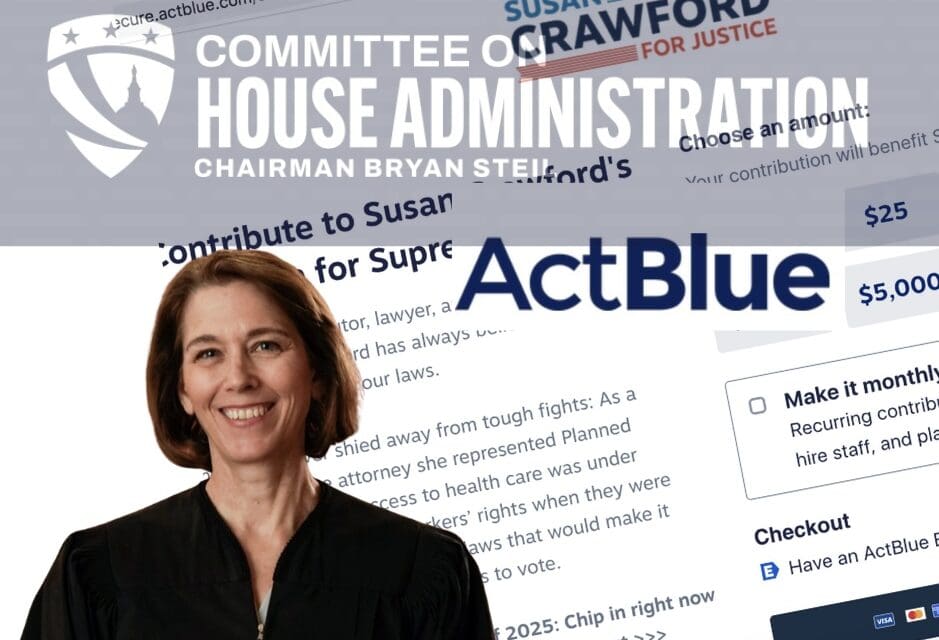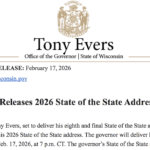Dane County Judge and Supreme Court Candidate Continues to Use Controversial Donor Platform Despite National and State Investigations
Originally published March 28, 2025
She has raised more money than any judicial candidate in US history.
She has, in fact, brought in as much campaign money as all but a handful of candidates who have ever run for any office in Wisconsin’s history.
Yet how Susan Crawford has done it has gone largely unreported.
Crawford, the liberal candidate running for the Wisconsin Supreme Court in the April 1 election, has raised at least $26 million (with more pouring in every day).
More than 75 percent of 126,000+ individual donors to Crawford’s campaign do not live in Wisconsin and most of the donations have come via ActBlue, a controversial Democratic fundraising platform facing intense congressional and state scrutiny over alleged campaign finance violations.
According to a recent report by The American Spectator, the platform Crawford uses to raise money “is suspected of identity theft, credit card fraud, and various other financial crimes.”
Crawford, a Dane County Circuit Court judge, could raise and spend more than $30 million when all campaign finance reports are filed after this election. What is known is that much of this funding flows through ActBlue, which has processed over $16 billion for Democratic causes since 2004.
Beyond small dollar contributors processed through Act Blue, Crawford’s donors include high-profile figures like George Soros, Illinois Gov. J.B. Pritzker, and LinkedIn co-founder Reid Hoffman, whose contributions have been legally funneled through the Democratic Party of Wisconsin to her campaign. This financial juggernaut has positioned Crawford as a formidable contender against conservative Waukesha County Judge Brad Schimel, but it also ties a potential member of the Wisconsin Supreme Court to a platform facing allegations of enabling fraud, money laundering, and illegal foreign donations.
Earlier this year, Rep. Andy Biggs, R-Ariz., sent a letter to the FBI calling for an investigation into ActBlue over concerns the platform had “been used to skirt the integrity of federal campaign finance laws.”
Recent developments in the brewing controversy include the abrupt resignation of at least seven senior officials in late February 2025, sparking concerns about the organization’s stability. These departures, reported by outlets like The New York Times and Washington Examiner, include key figures such as the customer service director, partnerships director, and chief revenue officer. The reasons for these exits remain unclear, though internal unrest is evident. Zain Ahmad, the last remaining lawyer in ActBlue’s general counsel’s office, was reportedly locked out of his email after raising whistleblower protection concerns, suggesting possible retaliation within the organization. Two unions representing ActBlue workers have since demanded an external investigation, citing a loss of confidence in leadership of the troubled company.
The congressional action targeting ActBlue has escalated in recent months, driven by Congressional and State probes the platform’s donor verification practices and their implications for campaign finance integrity. The House Committee on Oversight and Accountability, chaired by Rep. James Comer of Kentucky, launched an investigation in September 2024 into “potentially fraudulent and illicit financial activity” linked to ActBlue contributions. Comer, alongside Rep. Nick Langworthy of New York and other committee Republicans, sent a letter to then-Treasury Secretary Janet Yellen requesting all Suspicious Activity Reports (SARs) related to ActBlue by October 4, 2024. The committee expressed concerns that ActBlue’s lax security—such as not requiring Card Verification Value (CVV) codes until December 2024—may have enabled “straw donations” (contributions made under false identities) and illegal foreign funding from nations like China, Russia, Iran, and Venezuela.
Parallel to this, the House Committee on House Administration, led by 1st District Chairman Bryan Steil of Janesville, has taken aggressive steps to investigate ActBlue’s operations. On August 5, 2024, Steil announced an expanded probe into the platform’s donor verification standards, citing reports of large donations from retirees on fixed incomes and patterns of small, frequent contributions—such as hundreds of $2.50 donations from single individuals—that raised red flags. By September 6, 2024, Steil introduced H.R. 9488, the Secure Handling of Internet Electronic Donations (SHIELD) Act, which mandates CVV and billing address verification for online contributions and bans prepaid card donations. The bill passed the committee by voice vote on September 11, 2024, signaling bipartisan concern over online fundraising vulnerabilities.
Steil’s investigation gained momentum on October 28, 2024, when he demanded documents from ActBlue detailing its donor verification policies and potential exploitation by foreign actors. When ActBlue’s response was deemed insufficient, Steil issued a subpoena on October 30, 2024, compelling the platform to produce records related to its security protocols. On December 9, 2024, Steil released preliminary findings from the subpoena, though specifics remain under wraps as the committee continues its review. Rep. Laurel Lee of Florida, chair of the committee’s elections subcommittee, told Fox News Digital that the investigation uncovered “loopholes in ActBlue’s insufficient security protocols” that could allow foreign entities to donate under American names without consent. House Majority Leader Steve Scalise of Louisiana endorsed the subpoena, emphasizing the need to shield elections from foreign interference.
The Oversight Committee’s probe has also flagged ActBlue’s history of reporting anomalies, such as attributing thousands of donations to individuals unaware of their scale.
Some will dismiss this as mere campaign season accusations, brought up by Republicans. ActBlue, for its part, denies wrongdoing. “We rigorously protect our donors’ security and enforce strict anti-fraud compliance policies,” the organization said in a statement, noting its support for Steil’s Secure Handling of Internet Electronic Donations (SHIELD) Act. Yet, the investigations continue, with potential implications for Crawford’s campaign as the election looms on Tuesday.
Crawford’s campaign, which relies on ActBlue’s infrastructure for her online donations, has not addressed these congressional actions directly. Her financial disclosures to date show a broad donor base, with more than 126,000 individual contributors, and the platform’s role in processing out-of-state funds—mirrors patterns under congressional and state review.
To be clear, no evidence directly implicates Crawford’s campaign in fraud.
Yet, the SHIELD Act, if enacted, could force changes to how campaigns like Crawford’s operate in the future.
The current federal and state investigations may uncover concrete evidence of malfeasance in some or many campaigns in the weeks and moths ahead, but not before Wisconsin voters’ decisions are finalized on April 1.
Background, Fact Checking and Further Reading
- Crawford Campaign Finance: Wisconsin Ethics Commission filings
- 100,000-plus donors from all 50 states flood Wisconsin Supreme Court race with cash: Milwaukee Journal Sentinel
- Crawford Fundraising Details: The Badger Project
- Chaos and fraud, a look at the allegations against Act Blue : Washington Examiner
- Donor Information: Milwaukee Journal Sentinel
- ActBlue Resignations: The New York Times
- ActBlue Resignations and Unions: Washington Examiner
- Oversight Committee Probe: House Oversight Committee
- House Administration Probe and SHIELD Act: House Administration Committee
- SHIELD Act Text: Congress.gov
- ActBlue Probes May Shut Down DNC Money Laundry
- ActBlue Statement: ActBlue Official Response
- https://secure.actblue.com/ (See press releases and blog updates)
- Out-of-State Donation Stats: OpenSecrets










